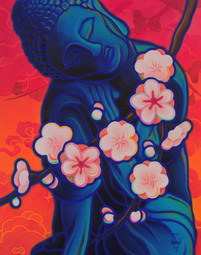
The nature of everything is illusory and ephemeral, Those with dualistic perception regard suffering as happiness, Like they who lick the honey from a razor’s edge. How pitiful are they who cling strongly to concrete reality: Turn your attention within, my heart friends.
Nyoshul Khen Ripoche.
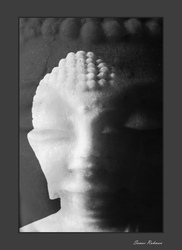
A person who is liberated, who has freed his or her mind of all mental afflictions, still experiences physical suffering. The difference between us and an arhat, a person who has freed the mind from mental affliction, is that an arhat doesn’t identify with pain. Arhats experience physical pain vividly but don’t grasp onto it; they can take action to avoid or alleviate pain, but whether they do so or not, the physical pain doesn’t come inside. What an arhat does not experience is mental suffering. A buddha, one who is perfectly spiritually awakened, has gone a further step. A buddha has no mental suffering of his or her own, but is vividly and non-dually aware of the suffering of others. Superficially, the arhat who is free from mental suffering can seem to us who lack this realization as numb and detached, in a state of existential anesthesia. A buddha, one who is fully awakened, presents the paradox of being free from suffering and also non-dually present with other people’s joys and sorrows, hopes and fears. A buddha taps into immutable bliss, the ultimate ground state of awareness beyond the dichotomy of stimulus-driven pain and pleasure. The mind of a buddha has been purified of all obscuration and from its own nature there naturally arises immutable bliss, like a spring welling up from the earth. With the unveiling of the buddha-nature of unconditioned bliss, there is also a complete erosion of an absolute demarcation between self and other. The barrier is gone. This is why buddhas are vividly and non-dually aware of the suffering of others, their hopes and fears, the whole situation, and at the same time are not disengaged from the purity and bliss of their own awareness. The mind of a buddha doesn’t block out anything and nothing is inhibited, and this is why the awareness of an awakened being is frequently described as “unimaginable.”
B. Alan Wallace.
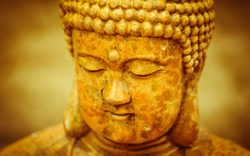
The mind in which anger arises is also the mind that holds it, hides it, fans it, justifies it, or suppresses it. That’s why this first step is crucial—before we can understand, befriend, tame, and transform our anger, we have to recognize it clearly and acknowledge it frankly. This is no small task. Self-awareness is a precondition for understanding and healing our anger. If we become aware of the workings of our mind we can discover the means by which we create our anger and the key to healing it. If we become aware that we are harboring irrational beliefs, ideas with false premises, mistaken assumptions or flawed logic, we can examine them and correct them. If we discover that we cherish ideas which are not in harmony with the realities of life and nature we can learn to relax into existence. If we find that we harbor desires, hopes, and expectations which cannot be achieved we have the option of letting them go.
Ron Leifer.
Hmmm I should stop posting quotes and go gather my books and stuff on this subject.
>>4745Why the fuck are you posting quotes anyways?
>>4747I for one am glad you posted them, I'm not well read on Buddhism but these ideas struck me very deeply
What are some key Buddhist texts?
I have no idea where to start.
I still need to read the Bhagavad Gita
>>4785just to be clear, you know that the Bhagavad Gita is hindu right?
Anyway it depends on what school of buddhism your talking about. For /fringe/ purposes however, the diamond sutra is a good place to start
>>4785I don't know but personally I like to go for fringe stuff that is written by someone who really knows a lot of systems and has shit figured out. Going back to the roots of something tends to be a waste of time, kind of like it's better to just read the more recent Alchemy books, than to waste time with the older ones.
>>4787Yes I do, but i was under the impression it was still an important part of the culture.
Im thinking Zen Buddhism? Im not familiar with the different sects. Ill start there, if I could get some more suggestions that would be fantastic.
>>4792I bet this is going to be upset someone btw – if so tell me what of value you learned from an old book and if you couldn't have got the same understanding much more efficiently with a new one.
>>4793Check out the stuff in the sticky. Fuck Zen Buddhism. If it's preferred by the masses, it's garbage. Do you see the masses who follow mainstream religion getting enlightened and developing all kinds of powers? Not really.
I think the forms of buddhism with sorcery in them are probably better to look at.
>>4796Buddhism is a pretty poor place to look for sorcery, because they see it as a distraction, rather than a goal. Looking into hindu siddhis would be a good idea for that.
>>4796I guess that shows how limited my views of buddhism are haha. I thought Zen was one of the smaller sects. Any specific names?
>>4798>distraction>implying there is a variant of buddhism that's all about sorcery >>4805I don't see how that sentence even remotely implies that.
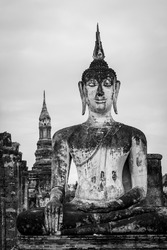
Don’t think that only sitting with the eyes closed is practice. If you do think this way, then quickly change your thinking. Steady practice is keeping mindful in every posture, whether sitting, walking, standing or lying down. When coming out of sitting, don’t think that you’re coming out of meditation, but that you are only changing postures. If you reflect in this way, you will have peace. Wherever you are, you will have this attitude of practice with you constantly. You will have a steady awareness within yourself.
Ajahn Chah.
yes goy, nothing is anything
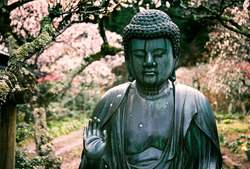
Conquer the angry man by love.
Conquer the ill-natured man by goodness.
Conquer the miser with generosity.
Conquer the liar with truth.
from the Dhammapada.
bretty good advice 5/5
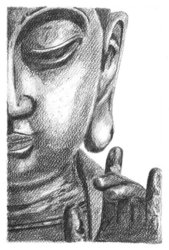
GOD-TIER QUOTE HERE:
Our problem is that inside us there’s a mind going, “Impossible, impossible, impossible. I can’t, I can’t, I can’t.” We have to banish that mind from this solar system. Anything is possible; everything is possible. Sometimes you feel that your dreams are impossible, but they’re not. Human beings have great potential; they can do anything. The power of the mind is incredible, limitless.
Lama Yeshe.
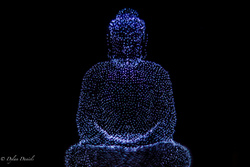
In India when we meet and part we often say “Namaste,”
I honor the place in you where the entire universe resides,
I honor the place in you of love, of light, of truth, of peace.
'''I honor the place within you where if you are in that place in you and I am in that place in me, there is only one of us.
Namaste.'''
Ram Das.
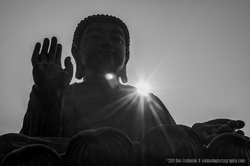
Perhaps the deepest reason why we are afraid of death is because we do not know who we are. We believe in a personal, unique, and separate identity — but if we dare to examine it, we find that this identity depends entirely on an endless collection of things to prop it up: our name, our “biography,” our partners, family, home, job, friends, credit cards… It is on their fragile and transient support that we rely for our security. So when they are all taken away, will we have any idea of who we really are?
Without our familiar props, we are faced with just ourselves, a person we do not know, an unnerving stranger with whom we have been living all the time but we never really wanted to meet. Isn’t that why we have tried to fill every moment of time with noise and activity, however boring or trivial, to ensure that we are never left in silence with this stranger on our own?
Sogyal Rinpoche.
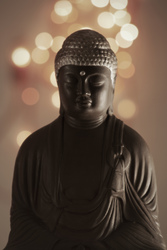
The essence of our experience is change. Change is incessant. Moment by moment life flows by and it is never the same. Perpetual alternation is the essence of the perceptual universe. A thought springs up in your head and half a second later, it is gone. In comes another one, and that is gone too. A sound strikes your ears, and then silence. Open your eyes and the world pours in, blink and it is gone too. People come into your life and they leave again. Friends go, relatives die. Your fortunes go up, and they go down. Sometimes you win and just as often you lose. It is incessant: change, change, change.
Bhante Henepola Gunaratana.
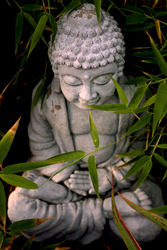
You are an aperture through which the universe is looking at and exploring itself.
Alan Watts.
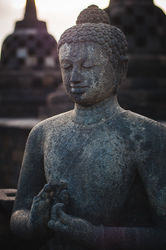
>>5764ANOTHER GOD-TIER QUOTE:We are not simply bystanders on a cosmic stage; we are shapers and creators living in a participatory universe.John Wheeler.Muh mental influence! Muh magic!
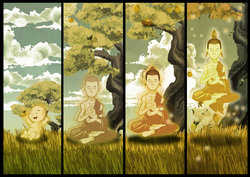
Most people feel cozy enough in samsara. They do not really have the genuine aspiration to go beyond samsara; they just want samsara to be a little bit better. The underlying motivation to go beyond samsara is very rare, even for people who go to Dharma centers. There are many people who learn to meditate and so forth, but with the underlying motive that they hope to make themselves feel better. And if it ends up making them feel worse, instead of realizing that this may be a good sign, they think there is something wrong with Dharma. We are always looking to make ourselves comfortable in the prison house. We might think that if we get the cell wall painted a pretty shade of pale green, and put in a few pictures, it won’t be a prison any more.
Jetsunma Tenzin Palmo.
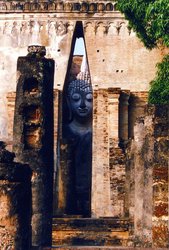
When I was in solitary retreat, I knew that I was together with all sentient beings in innumerable worlds. Even though I seemed to be alone in a small, enclosed room, actually I was in company with many ants who found their way inside, and there were many insects around the hut who created all kinds of sounds in the evening. When I opened the Sutras, people thousands of years in the past were talking to me. How could I feel lonely? Some people think I must feel lonely being a monk without any wife or children. Not at all. I have the 5 precepts and the 10 Virtuous Deeds as my wife, and my children are all the people who I have developed a karmic affinity with and who call me Shih-fu. It is only those pitiable people who enclose themselves and cannot establish a relationship with the outside world who feel lonely. If you keep yourself enclosed, even if you live among thousands of people you will still feel very lonely. However, if you keep yourself open, then even if you are living alone, you will still have a very full life. So open your mind and treat everyone as your intimate, virtuous friend.
Shih-fu Sheng-ye.
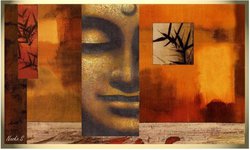
What is undistracted calm abiding? It is meditative absorption free of the six types of distraction. What are these six?
(1) Inherent distraction refers to the eye consciousness and the other four collections of consciousness. Because they are naturally directed outward, they [cause one to] emerge from meditative absorption.
(2) External distraction refers to a mental consciousness that reaches out towards or engages objects.
(3) Internal distraction concerns dullness and agitation, as well as savoring one’s meditative absorption.
(4) The distraction of marks occurs when, trusting in meditative absorption, one apprehends marks of it and becomes attached.
(5) Distraction brought about by negative tendencies is when directing the mind involves the apprehending of an ego. This is said to refer to the mental act of pridefully believing oneself to be superior to others, or [simply any mental act] that involves apprehending an “I.”
(6) The distraction of directing the mind occurs when one is caught up in the mindset of, and directs the mind in the style of, the Lesser Vehicle.
The undistracted calm abiding that is determined by the elimination of those six is the unique calm abiding of the Great Vehicle. This is a state of one-pointed inner rest, a flawless calm abiding. In it, there is no apprehension of marks, as is the case when inner absorption alone is believed to bring liberation. Neither does it involve the ego apprehension that occurs in the concentrations of non-Buddhists. Further, one does not direct the mind as one would when cultivating the supports for the inferior paths [to liberation]. This is how the wise should understand the calm abiding of the Great Vehicle.
Khenpo Shenga and Ju Mipham.
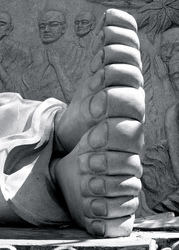
Shantideva cites three benefits of pain. First, it is valuable because through sorrow, pride is driven out. No matter how arrogant and condescending we’ve been, great suffering can humble us. The pain of a serious illness or loss of a loved one can be transformative, softening us and making us less self-centered. The second benefit of pain is empathy: the compassion felt for those who wander in samsara. Our personal suffering brings compassion for others in the same situation. A young woman was telling me that when her baby died, she felt a deep connection to all the other parents who had lost children. This was, as she put it, the unexpected blessing of her sorrow. The third value of suffering is that evil is avoided and goodness seems delightful. When we practice according to Shantideva’s instructions, we can get smarter about cause and result. Based on this understanding, we’ll have less inclination to cause harm, and more desire to gather virtue and benefit others.
Pema Chödrön.
I agree with this. I just wish I could help others experience the divine ;_;.
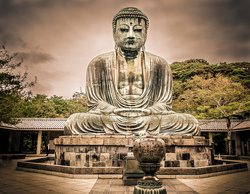
All things are interrelated and interdependent; nothing exists in isolation. The entire universe is one ecosystem, similar to a spider web — if one part is touched, the entire net shimmers. As a result of interrelatedness and interdependency, every expression of energy, including our thoughts and intentions, ultimately touches and affects everything else.
Matthew Flickstein.
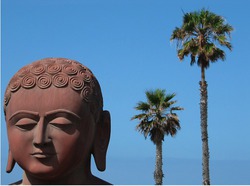
Emptiness is not a negative state; it denotes a mind that has no tension, no worry or fear, and is wide open to see the Dharma within. Such a mind has let go of all preconceived ideas about the world and the people in it. If our ideas up to now have not brought total and absolute happiness, it is much better to let go of them and be an empty vessel into which the Dharma can be poured. As the Dharma fills us, it changes our outlook and eventually brings us to right view.
Ayya Khema.

The solution is not to suppress our thoughts and desires, for this would be impossible; it would be like trying to keep a pot of water from boiling by pressing down tightly on the lid. The only sensible approach is to train ourselves to observe our thoughts without following them. This deprives them of their compulsive energy and is therefore like removing the pot of boiling water from the fire.
Lama Thubten Yeshe.
Shouldn't some thoughts be followed though? This is just wasting loosh.
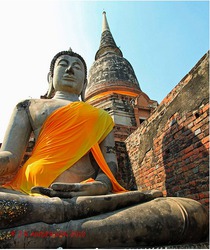
Meditation takes gumption. It is certainly a great deal easier just to sit back and watch television. So why bother? Why waste all that time and energy when you could be out enjoying yourself? Why? Simple. Because you are human. And just because of the simple fact that you are human, you find yourself heir to an inherent unsatisfactoriness in life, which simply will not go away. You can suppress it from your awareness for a time. You can distract yourself for hours on end, but it always comes back— usually when you least expect it. All of a sudden, seemingly out of the blue, you sit up, take stock, and realize your actual situation in life.
Bhante Henepola Gunaratana.

When you begin to study Zen, you aim to attain realization. Your motive is good in so far as motive is concerned, but in your meditation you should aim at nothing. You may aim at realization to encourage yourself when you are not meditating, but beware of clinging entanglements. Encouragement is one thing, meditation is another. Do not mix them up. Carry your meditation as the eternal present, and saturate your everyday life with it.
Nyogen Senzaki.
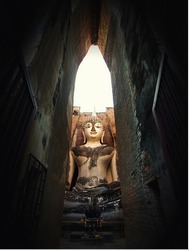
There is a Vietnamese proverb, “Tri tuc, tien tuc, dai tuc, ha thoi tuc.” That means, settling for “good enough” is enough. If we wait until all our needs and wants are met, we may wait forever. “Tri tuc” means “good enough.” “Good enough” means being content with the minimum amount necessary. Your shirt and pair of shoes can last another year. It’s all right for three or four people to share a desk for studying, there’s no need for each to have her own desk. Settling for “good enough” in terms of simple living will bring us contentment, satisfaction, and happiness immediately. As long as we think our lives are not good enough (materially), we will not have happiness. As soon as we realize our lives are good enough, happiness immediately appears. That is the practice of contentment.
In Vietnam there’s a school of Buddhism called the Four Gratitudes. Just by practicing gratitude, we can find happiness. We must be grateful to our ancestors, our parents, our teachers, our friends, the Earth, the sky, the trees, the grass, the animals, the soil, the stones. Looking at the sunlight or at the forest, we feel gratitude. Looking at our breakfast, we feel gratitude. When we live in the spirit of gratitude, there will be much happiness in our life. The one who is grateful is the one who has much happiness while the one who is ungrateful will not be able to have happiness.
Thich Nhat Hanh.
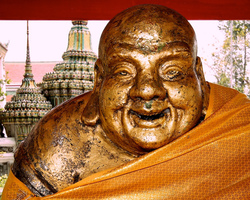
If you seek liberation, you must have more than an intellectual understanding of suffering, its causes, and the antidotes; you must practice for this understanding to mature. Just as a deer shot by a hunter retreats into solitude to heal itself, so too, you should withdraw from all superfluous activity. At the very least, occasionally withdraw into solitude in order to practice. As a result, you may realize the one taste of reality and cut through the divisions created by delusion, attachment, and hatred. Once you have gained this realization, you become as fearless and powerful as a snow lion. You have then achieved the state of confidence. At this point, your own self-interest is fulfilled as you observe all phenomena as displays of awareness. Having brought your own inner transformation to perfection with the motivation of being of benefit to others, you are now fully capable of serving others’ needs. This is the path of a true Dharma practitioner.
Karma Chagme.
I probably should follow this very advice here.
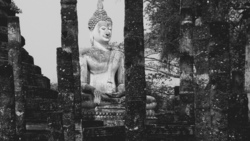
Always recognize the dreamlike qualities of life and reduce attachment and aversion. Practice good-heartedness toward all beings. Be loving and compassionate, no matter what others do to you. What they will do will not matter so much when you see it as a dream. The trick is to have positive intention during the dream. This is the essential point. This is true spirituality.
Chakdud Tulku Rinpoche.

Contrary to what some people might believe, there is nothing wrong with having pleasures and enjoyments. What is wrong is the confused way we grasp onto these pleasures, turning them from a source of happiness into a source of pain and dissatisfaction.
Lama Thubten Yeshe.
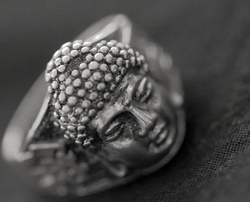
It is a simple fact: whatever you resist will persist. If you are resisting suffering, you suffer more. If you are resisting confusion, you remain confused. If you are looking for peace, you find yourself constantly disturbed. If you are seeking after clarity, you are in a muddle. If you do not want to be angry, you are going to walk around angry. If you do not mind being angry, you will never be bothered about anger, because you will not be holding on to it. Having no opinion for or against, just being open to whatever comes, you are free.
Dennis Genpo Merzel.
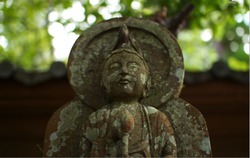
If we remain clinging to this life even for one day, we are misusing our time. In this way, we can waste months and years on end. Because we don’t know when our lives will finish, we should remain mindful and well prepared. Then, even if we die tonight, we will do so without regret. If we die tonight, the purpose of being well prepared is borne out; if we don’t die tonight, there is no harm in being well prepared, because it will still benefit us.
But when we leave the world of humans, we do so without a protector or supporter and the total responsibility falls on us. We only have our own intelligence to rely on at that time, so we must expend our own effort in order to protect ourselves. As the Buddha said, “I have shown you the path to liberation; know that liberation depends on you.” We must put strenuous effort into gaining freedom from the lower migrations, liberation from samsara, freedom from conventional existence and solitary salvation.
The body is compared to a guest house; it is a place to stay for just a short time and not permanently. At present, the guest of consciousness is staying in the guest house of the body, like renting a place to stay. When the day comes for consciousness to leave, the guest house of the body must be left behind. Not being attached to friends, the body, wealth and possessions is the practice of the Bodhisattvas.
His Holiness the Dalai Lama.
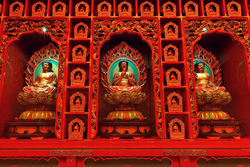
Once, during a retreat conducted by Zen Master Bankei, where many students from all over gathered to learn, one of them was caught stealing red-handed. The matter was promptly reported to Bankei, followed by the request to expel the thief. However, Bankei ignored the suggestion. A while later, the same student was again caught stealing. To the shock of the others, Bankei continued to disregard the crime. This led the students to petition for his dismissal, without which they would leave the retreat together.
After reading the petition, Bankei calmly addressed his students. ‘You are wise brothers. You know what is right and what is not right. You may go somewhere else to study if you wish, but this poor brother does not even know right from wrong. Who will teach him if I do not? I am going to keep him here even if all the rest of you leave.’ Upon hearing that, the thief wept in total remorse.
Speech Paul Reps.
That's some pretty heavy instruction in ethics there.

These days people don’t search for the Truth. People study simply in order to find knowledge necessary to make a living, raise families and look after themselves, that’s all. To them, being smart is more important than being wise!
Ajahn Chah.
I don't know how people can even give up on the quest for Truth. Fuck the rest, one can not go on in ignorance.

My teacher often likens meditation practice to a river flowing through our life. In the early stages, like a mountain spring, our practice is fleeting and undeveloped. There may be a fair few leaps and crashes before we settle into a more regular rhythm. Little by little our practice continues to grow and mature until eventually it becomes like a vast river, attracting everything else to it, no longer a small trickle in our life, but the most compelling force of it. The river may still encounter obstacles, but they are of little consequence. It will simply flow over or around them, having developed a smooth, calm, but unstoppable momentum.
David Michie.
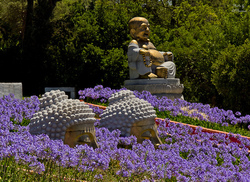
Everything can be used as an invitation to meditation. A smile, a face in the subway, the sight of a small flower growing in the crack of cement pavement, a fall of rich cloth in a shop window, the way the sun lights up flower pots on a windowsill. Be alert for any sign of beauty or grace. Offer up every joy, be awake at all moments, to “the news that is always arriving out of silence.” Slowly, you will become a master of your own bliss, a chemist of your own joy, with all sorts of remedies always at hand to elevate, cheer, illuminate, and inspire your every breath and movement.
Sogyal Rinpoche.
Accept everything that arises. Accept your feelings, even the ones you wish you did not have. Accept your experiences, even the ones you hate. Don’t condemn yourself for having human flaws and failings. Learn to see all phenomena in the mind as being perfectly natural and understandable. Try to exercise a disinterested acceptance at all times with respect to everything you experience.
Bhante Henepola Gunaratana.
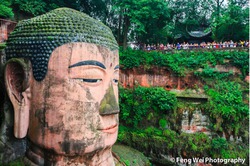
There are some skeptical persons who may think that when the mind is not moved by many thoughts, it will be in a stupid state. But stupidity does not arise just because the mind relaxes a little. On the contrary, the mind usually thinks too much. We are used to thinking uninterruptedly and continuously. If we look at these thoughts more closely, however, we discover that we seldom think meaningfully at all, and that most of our thinking is rather senseless. Such senseless thinking happens frequently and repeats itself over and over. In this way our many endlessly occurring thoughts are continuously going around and around in circles. If we are able to decrease this senseless thinking, meaningful thoughts will naturally increase all by themselves. And this is exactly the reason for the meditation on calm abiding: when the mind relaxes, senseless thinking will effortlessly diminish.
Khenchen Thrangu Rinpoche.
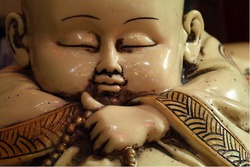
ANOTHER GOD-TIER QUOTE HERE:
Let me tell you about the middle path. Dressing in rough and dirty garments, letting your hair grow matted, abstaining from eating any meat or fish, does not cleanse the one who is deluded. Mortifying the flesh through excessive hardship does not lead to a triumph over the senses. All self-inflicted suffering is useless as long as the feeling of self is dominent.
You should lose your involvement with yourself and then eat and drink naturally, according to the needs of your body. Attachment to your appetites - whether you deprive or indulge them - can lead to slavery, but satisfying the needs of daily life is not wrong. Indeed, to keep a body in good health is a duty, for otherwise the mind will not stay strong and clear.
The Buddha.
Thousands of candles can be lighted from a single candle, and the life of the candle will not be shortened. Happiness never decreases by being shared.
- The Buddha